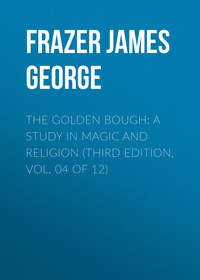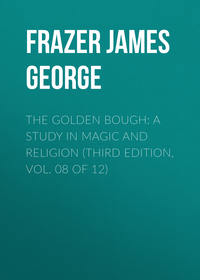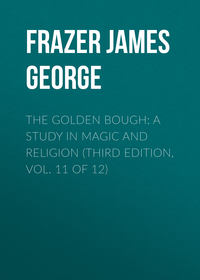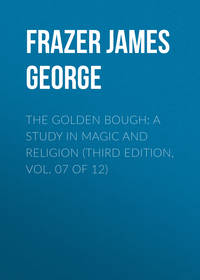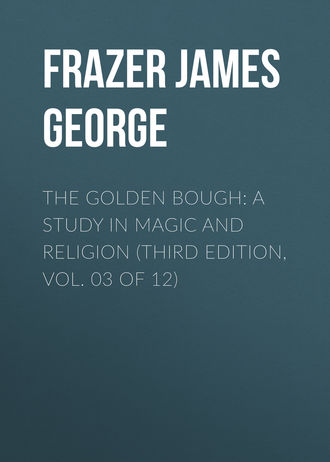 полная версия
полная версияThe Golden Bough: A Study in Magic and Religion (Third Edition, Vol. 03 of 12)
The Gordian knot was perhaps a royal talisman.
Before quitting the subject of knots I may be allowed to hazard a conjecture as to the meaning of the famous Gordian knot, which Alexander the Great, failing in his efforts to untie it, cut through with his sword. In Gordium, the ancient capital of the kings of Phrygia, there was preserved a waggon of which the yoke was fastened to the pole by a strip of cornel-bark or a vine-shoot twisted and tied in an intricate knot. Tradition ran that the waggon had been dedicated by Midas, the first king of the dynasty, and that whoever untied the knot would be ruler of Asia.1184 Perhaps the knot was a talisman with which the fate of the dynasty was believed to be bound up in such a way that whenever the knot was loosed the reign of the dynasty would come to an end. We have seen that the magic virtue ascribed to knots is naturally enough supposed to last only so long as they remain untied. If the Gordian knot was the talisman of the Phrygian kings, the local fame it enjoyed, as guaranteeing to them the rule of Phrygia, might easily be exaggerated by distant rumour into a report that the sceptre of Asia itself would fall to him who should undo the wondrous knot.1185
Chapter VI. Tabooed Words
§ 1. Personal Names tabooed
The savage confuses words and things, and hence regards his name as a vital part of himself, and fancies that he can be magically injured through it.
Unable to discriminate clearly between words and things, the savage commonly fancies that the link between a name and the person or thing denominated by it is not a mere arbitrary and ideal association, but a real and substantial bond which unites the two in such a way that magic may be wrought on a man just as easily through his name as through his hair, his nails, or any other material part of his person.1186 In fact, primitive man regards his name as a vital portion of himself and takes care of it accordingly. Thus, for example, the North American Indian “regards his name, not as a mere label, but as a distinct part of his personality, just as much as are his eyes or his teeth, and believes that injury will result as surely from the malicious handling of his name as from a wound inflicted on any part of his physical organism. This belief was found among the various tribes from the Atlantic to the Pacific, and has occasioned a number of curious regulations in regard to the concealment and change of names. It may be on this account that both Powhatan and Pocahontas are known in history under assumed appellations, their true names having been concealed from the whites until the pseudonyms were too firmly established to be supplanted. Should his prayers have no apparent effect when treating a patient for some serious illness, the shaman sometimes concludes that the name is affected, and accordingly goes to water, with appropriate ceremonies, and christens the patient with a new name, by which he is henceforth to be known. He then begins afresh, repeating the formulas with the new name selected for the patient, in the confident hope that his efforts will be crowned with success.”1187 Some Esquimaux take new names when they are old, hoping thereby to get a new lease of life.1188 The Tolampoos of central Celebes believe that if you write a man's name down you can carry off his soul along with it. On that account the headman of a village appeared uneasy when Mr. A. C. Kruijt wrote down his name. He entreated the missionary to erase it, and was only reassured on being told that it was not his real name but merely his second name that had been put on paper. Again, when the same missionary took down the names of villages from the lips of a woman, she asked him anxiously if he would not thereby take away the soul of the villages and so cause the inhabitants to fall sick.1189 If we may judge from the evidence of language, this crude conception of the relation of names to persons was widely prevalent, if not universal, among the forefathers of the Aryan race. For an analysis of the words for “name” in the various languages of that great family of speech points to the conclusion that “the Celts, and certain other widely separated Aryans, unless we should rather say the whole Aryan family, believed at one time not only that the name was a part of the man, but that it was that part of him which is termed the soul, the breath of life, or whatever you may choose to define it as being.”1190 However this may have been among the primitive Aryans, it is quite certain that many savages at the present day regard their names as vital parts of themselves, and therefore take great pains to conceal their real names, lest these should give to evil-disposed persons a handle by which to injure their owners.
The Australian savages keep their names secret lest sorcerers should injure them by means of their names.
Thus, to begin with the savages who rank at the bottom of the social scale, we are told that the secrecy with which among the Australian aborigines personal names are often kept from general knowledge “arises in great measure from the belief that an enemy, who knows your name, has in it something which he can use magically to your detriment.”1191 “An Australian black,” says another writer, “is always very unwilling to tell his real name, and there is no doubt that this reluctance is due to the fear that through his name he may be injured by sorcerers.”1192 On Herbert River in Queensland the wizards, in order to practise their arts against some one, “need only to know the name of the person in question, and for this reason they rarely use their proper names in addressing or speaking of each other, but simply their class names.”1193 In the tribes of south-eastern Australia “when the new name is given at initiation, the child's name becomes secret, not to be revealed to strangers, or to be mentioned by friends. The reason appears to be that a name is part of a person, and therefore can be made use of to that person's detriment by any who wish to ‘catch’ him by evil magic.”1194 Thus among the Yuin of New South Wales the totem name is said to have been something magical rather than a mere name in our sense, and it was kept secret lest an enemy should injure its bearer by sorcery. The name was revealed to a youth by his father at initiation, but very few other people knew it.1195 Another writer, who knew the Australians well, observes that in many tribes the belief prevails “that the life of an enemy may be taken by the use of his name in incantations. The consequence of this idea is, that in the tribes in which it obtains, the name of the male is given up for ever at the time when he undergoes the first of a series of ceremonies which end in conferring the rights of manhood. In such tribes a man has no name, and when a man desires to attract the attention of any male of his tribe who is out of his boyhood, instead of calling him by name, he addresses him as brother, nephew, or cousin, as the case may be, or by the name of the class to which he belongs. I used to notice, when I lived amongst the Bangerang, that the names which the males bore in infancy were soon almost forgotten by the tribe.”1196 It may be questioned, however, whether the writer whom I have just quoted was not deceived in thinking that among these tribes men gave up their individual names on passing through the ceremony of initiation into manhood. It is more in harmony with savage beliefs and practices to suppose either that the old names were retained but dropped out of use in daily life, or that new names were given at initiation and sedulously concealed from fear of sorcery. A missionary who resided among the aborigines at Lake Tyers, in Victoria, informs us that “the blacks have great objections to speak of a person by name. In speaking to each other they address the person spoken to as brother, cousin, friend, or whatever relation the person spoken to bears. Sometimes a black bears a name which we would term merely a nickname, as the left-handed, or the bad-handed, or the little man. They would speak of a person by this name while living, but they would never mention the proper name. I found great difficulty in collecting the native names of the blacks here. I found afterwards that they had given me wrong names; and, on asking the reason why, was informed they had two or three names, but they never mentioned their right name for fear any one got it, then they would die.”1197 Amongst the tribes of central Australia every man, woman, and child has, besides a personal name which is in common use, a secret or sacred name which is bestowed by the older men upon him or her soon after birth, and which is known to none but the fully initiated members of the group. This secret name is never mentioned except upon the most solemn occasions; to utter it in the hearing of women or of men of another group would be a most serious breach of tribal custom, as serious as the most flagrant case of sacrilege among ourselves. When mentioned at all, the name is spoken only in a whisper, and not until the most elaborate precautions have been taken that it shall be heard by no one but members of the group. “The native thinks that a stranger knowing his secret name would have special power to work him ill by means of magic.”1198
The same fear of sorcery has led people to conceal their names in Egypt, Africa, Asia, and the East Indies.
The same fear seems to have led to a custom of the same sort amongst the ancient Egyptians, whose comparatively high civilisation was strangely dashed and chequered with relics of the lowest savagery. Every Egyptian received two names, which were known respectively as the true name and the good name, or the great name and the little name; and while the good or little name was made public, the true or great name appears to have been carefully concealed.1199 Similarly in Abyssinia at the present day it is customary to conceal the real name which a person receives at baptism and to call him only by a sort of nickname which his mother gives him on leaving the church. The reason for this concealment is that a sorcerer cannot act upon a person whose real name he does not know. But if he has ascertained his victim's real name, the magician takes a particular kind of straw, and muttering something over it bends it into a circle and places it under a stone. The person aimed at is taken ill at the very moment of the bending of the straw; and if the straw snaps, he dies.1200 A Brahman child receives two names, one for common use, the other a secret name which none but his father and mother should know. The latter is only used at ceremonies such as marriage. The custom is intended to protect the person against magic, since a charm only becomes effectual in combination with the real name.1201 Amongst the Kru negroes of West Africa a man's real name is always concealed from all but his nearest relations; to other people he is known only under an assumed name.1202 The Ewe-speaking people of the Slave Coast “believe that there is a real and material connexion between a man and his name, and that by means of the name injury may be done to the man. An illustration of this has been given in the case of the tree-stump that is beaten with a stone to compass the death of an enemy; for the name of that enemy is not pronounced solely with the object of informing the animating principle of the stump who it is whose death is desired, but through a belief that, by pronouncing the name, the personality of the man who bears it is in some way brought to the stump.”1203 The Wolofs of Senegambia are very much annoyed if any one calls them in a loud voice, even by day; for they say that their name will be remembered by an evil spirit and made use of by him to do them a mischief at night.1204 Similarly, the natives of Nias believe that harm may be done to a person by the demons who hear his name pronounced. Hence the names of infants, who are especially exposed to the assaults of evil spirits, are never spoken; and often in haunted spots, such as the gloomy depths of the forest, the banks of a river, or beside a bubbling spring, men will abstain from calling each other by their names for a like reason.1205 Among the hill tribes of Assam each individual has a private name which may not be revealed. Should any one imprudently allow his private name to be known, the whole village is tabooed for two days and a feast is provided at the expense of the culprit.1206 A Manegre, of the upper valley of the Amoor, will never mention his own name nor that of one of his fellows. Only the names of children are an exception to this rule.1207 A Bagobo man of Mindanao, one of the Philippine Islands, never utters his own name from fear of being turned into a raven, because the raven croaks out its own name.1208 The natives of the East Indian island of Buru, and the Manggarais of West Flores are forbidden by custom to mention their own names.1209 When Fafnir had received his death-wound from Sigurd, he asked his slayer what his name was; but the cunning Sigurd concealed his real name and mentioned a false one, because he well knew how potent are the words of a dying man when he curses his enemy by name.1210
The South and Central American Indians also keep their names secret from fear of sorcery.
The Indians of Chiloe, a large island off the southern coast of Chili, keep their names secret and do not like to have them uttered aloud; for they say that there are fairies or imps on the mainland or neighbouring islands who, if they knew folk's names, would do them an injury; but so long as they do not know the names, these mischievous sprites are powerless.1211 The Araucanians, who inhabit the mainland of Chili to the north of Chiloe, will hardly ever tell a stranger their names because they fear that he would thereby acquire some supernatural power over themselves. Asked his name by a stranger, who is ignorant of their superstitions, an Araucanian will answer, “I have none.”1212 Names taken from plants, birds, or other natural objects are bestowed on the Indians of Guiana at their birth by their parents or the medicine-man, “but these names seem of little use, in that owners have a very strong objection to telling or using them, apparently on the ground that the name is part of the man, and that he who knows the name has part of the owner of that name in his power. To avoid any danger of spreading knowledge of their names, one Indian, therefore, generally addresses another only according to the relationship of the caller and the called, as brother, sister, father, mother, and so on; or, when there is no relationship, as boy, girl, companion, and so on. These terms, therefore, practically form the names actually used by Indians amongst themselves.”1213 Amongst the Indians of the Goajira peninsula in Colombia it is a punishable offence to mention a man's name; in aggravated cases heavy compensation is demanded.1214 The Indians of Darien never tell their names, and when one of them is asked, “What is your name?” he answers, “I have none.”1215 For example, the Guami of Panama, “like the greater part of the American Indians, has several names, but that under which he is known to his relations and friends is never mentioned to a stranger; according to their ideas a stranger who should learn a man's name would obtain a secret power over him. As to the girls, they generally have no name of their own up to the age of puberty.”1216 Among the Tepehuanes of Mexico a name is a sacred thing, and they never tell their real native names.1217
Similar superstition as to personal names among the Indians of North America.
In North America superstitions of the same sort are current. “Names bestowed with ceremony in childhood,” says Schoolcraft, “are deemed sacred, and are seldom pronounced, out of respect, it would seem, to the spirits under whose favour they are supposed to have been selected. Children are usually called in the family by some name which can be familiarly used.”1218 The Navajoes of New Mexico are most unwilling to reveal their own Indian names or those of their friends; they generally go by some Mexican names which they have received from the whites.1219 “No Apache will give his name to a stranger, fearing some hidden power may thus be placed in the stranger's hand to his detriment.”1220 The Tonkawe Indians of Texas will give their children Comanche and English names in addition to their native names, which they are unwilling to communicate to others; for they believe that when somebody calls a person by his or her native name after death the spirit of the deceased may hear it, and may be prompted to take revenge on such as disturbed his rest; whereas if the spirit be called by a name drawn from another language, it will pay no heed.1221 Speaking of the Californian Indians, and especially of the Nishinam tribe, a well-informed writer observes: “One can very seldom learn an Indian's and never a squaw's Indian name, though they will tell their American titles readily enough… No squaw will reveal her own name, but she will tell all her neighbors' that she can think of. For the reason above given many people believe that half the squaws have no names at all. So far is this from the truth that every one possesses at least one and sometimes two or three.”1222 Blackfoot Indians believe that they would be unfortunate in all their undertakings if they were to speak their names.1223 When the Canadian Indians were asked their names, they used to hang their heads in silence or answer that they did not know.1224 When an Ojebway is asked his name, he will look at some bystander and ask him to answer. “This reluctance arises from an impression they receive when young, that if they repeat their own names it will prevent their growth, and they will be small in stature. On account of this unwillingness to tell their names, many strangers have fancied that they either have no names or have forgotten them.”1225
Sometimes savages, though they will not utter their own names, do not object to other people's doing so.
In this last case no scruple seems to be felt about communicating a man's name to strangers, and no ill effects appear to be dreaded as a consequence of divulging it; harm is only done when a name is spoken by its owner. Why is this? and why in particular should a man be thought to stunt his growth by uttering his own name? We may conjecture that to savages who act and think thus a person's name only seems to be a part of himself when it is uttered with his own breath; uttered by the breath of others it has no vital connexion with him, and no harm can come to him through it. Whereas, so these primitive philosophers may have argued, when a man lets his own name pass his lips, he is parting with a living piece of himself, and if he persists in so reckless a course he must certainly end by dissipating his energy and shattering his constitution. Many a broken-down debauchee, many a feeble frame wasted with disease, may have been pointed out by these simple moralists to their awe-struck disciples as a fearful example of the fate that must sooner or later overtake the profligate who indulges immoderately in the seductive habit of mentioning his own name.
Men who will not mention their own names will yet invite other people to do so for them.
However we may explain it, the fact is certain that many a savage evinces the strongest reluctance to pronounce his own name, while at the same time he makes no objection at all to other people pronouncing it, and will even invite them to do so for him in order to satisfy the curiosity of an inquisitive stranger. Thus in some parts of Madagascar it is fàdy or taboo for a person to tell his own name, but a slave or attendant will answer for him.1226 “Chatting with an old Sakalava while the men were packing up, we happened to ask him his name; whereupon he politely requested us to ask one of his servants standing by. On expressing our astonishment that he should have forgotten this, he told us that it was fàdy (tabooed) for one of his tribe to pronounce his own name. We found this was perfectly true in that district, but it is not the case with the Sakalava a few days farther down the river.”1227 The same curious inconsistency, as it may seem to us, is recorded of some tribes of American Indians. Thus we are told that “the name of an American Indian is a sacred thing, not to be divulged by the owner himself without due consideration. One may ask a warrior of any tribe to give his name, and the question will be met with either a point-blank refusal or the more diplomatic evasion that he cannot understand what is wanted of him. The moment a friend approaches, the warrior first interrogated will whisper what is wanted, and the friend can tell the name, receiving a reciprocation of the courtesy from the other.”1228 This general statement applies, for example, to the Indian tribes of British Columbia, as to whom it is said that “one of their strangest prejudices, which appears to pervade all tribes alike, is a dislike to telling their names – thus you never get a man's right name from himself; but they will tell each other's names without hesitation.”1229 Though it is considered very rude for a stranger to ask an Apache his name, and the Apache will never mention it himself, he will allow his friend at his side to mention it for him.1230 The Abipones of South America thought it a sin in a man to utter his own name, but they would tell each other's names freely; when Father Dobrizhoffer asked a stranger Indian his name, the man would nudge his neighbour with his elbow as a sign that his companion should answer the question.1231 Some of the Malemut Esquimaux of Bering Strait dislike very much to pronounce their own names; if a man be asked his name he will appear confused and will generally turn to a bystander, and request him to mention it for him.1232 In the whole of the East Indian Archipelago the etiquette is the same. As a general rule no one will utter his own name. To enquire, “What is your name?” is a very indelicate question in native society. When in the course of administrative or judicial business a native is asked his name, instead of replying he will look at his comrade to indicate that he is to answer for him, or he will say straight out, “Ask him.” The superstition is current all over the East Indies without exception,1233 and it is found also among the Motu and Motumotu tribes of British New Guinea,1234 the Papuans of Finsch Haven in German New Guinea,1235 the Nufoors of Dutch New Guinea,1236 and the Melanesians of the Bismarck Archipelago.1237 Among many tribes of South Africa men and women never mention their names if they can get any one else to do it for them, but they do not absolutely refuse when it cannot be avoided.1238 No Warua will tell his name, but he does not object to being addressed by it.1239 Among the Masai, “when a man is called or spoken to, he is addressed by his father's name, and his own name is only used when speaking to his mother. It is considered unlucky for a man to be addressed by name. The methods employed in finding out what an individual is called seem apt to lead to confusion. If a man is asked his name, he replies by giving that of his father, and to arrive at his own name it is necessary to ask a third person, or to ask him what is the name of his mother. There is no objection to another person mentioning his name even in his presence.”1240 We are told that the Wanyamwesi almost always address each other as “Mate” or “Friend,” and a man sometimes quite forgets his own name and has to be reminded of it by another.1241 The writer who makes this statement was probably unaware of the reluctance of many savages to utter their own names, and hence he mistook that reluctance for forgetfulness. In Uganda no one will mention his totem. If it is necessary that it should be known, he will ask a bystander to mention it for him.1242 The Ba-Lua in the Congo region are unwilling to pronounce the name of their tribe; if they are pressed on the subject, they will call on some foreigner to give the required information.1243
Sometimes the prohibition to mention personal names is not permanent but temporary and contingent.
Sometimes the embargo laid on personal names is not permanent; it is conditional on circumstances, and when these change it ceases to operate. Thus when the Nandi men are away on a foray, nobody at home may pronounce the names of the absent warriors; they must be referred to as birds. Should a child so far forget itself as to mention one of the distant ones by name, the mother would rebuke it, saying, “Don't talk of the birds who are in the heavens.”1244 Among the Bangala of the Upper Congo, while a man is fishing and when he returns with his catch, his proper name is in abeyance and nobody may mention it. Whatever the fisherman's real name may be, he is called mwele without distinction. The reason is that the river is full of spirits, who, if they heard the fisherman's real name, might so work against him that he would catch little or nothing. Even when he has caught his fish and landed with them, the buyer must still not address him by his proper name, but must only call him mwele; for even then, if the spirits were to hear his proper name, they would either bear it in mind and serve him out another day, or they might so mar the fish he had caught that he would get very little for them. Hence the fisherman can extract heavy damages from anybody who mentions his name, or can compel the thoughtless speaker to relieve him of the fish at a good price so as to restore his luck.1245 When the Sulka of New Britain are near the territory of their enemies the Gaktei, they take care not to mention them by their proper name, believing that were they to do so, their foes would attack and slay them. Hence in these circumstances they speak of the Gaktei as o lapsiek, that is, “the rotten tree-trunks,” and they imagine that by calling them that they make the limbs of their dreaded enemies ponderous and clumsy like logs.1246 This example illustrates the extremely materialistic view which these savages take of the nature of words; they suppose that the mere utterance of an expression signifying clumsiness will homoeopathically affect with clumsiness the limbs of their distant foemen. Another illustration of this curious misconception is furnished by a Caffre superstition that the character of a young thief can be reformed by shouting his name over a boiling kettle of medicated water, then clapping a lid on the kettle and leaving the name to steep in the water for several days. It is not in the least necessary that the thief should be aware of the use that is being made of his name behind his back; the moral reformation will be effected without his knowledge.1247


